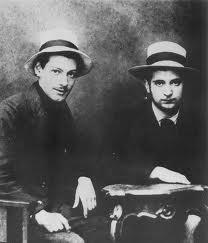Stanislav Vinaver
| Stanislav Vinaver | |
|---|---|

Milutin Bojić (left) and Stanislav Vinaver (right)
|
|
| Born |
1 March 1891 Šabac, Kingdom of Serbia |
| Died | 1 August 1955 (aged 64) Niška Banja, PR Serbia, FPR Yugoslavia |
| Resting place | New Cemetery, Belgrade |
| Occupation | Writer • poet • translator • journalist |
| Nationality | Serbian (1891–1918) Yugoslav (1918–1955) |
| Ethnicity | Jewish |
| Alma mater | University of Paris |
| Years active | 1911–1955 |
| Spouse | Elsa Vinaver |
| Children | 2 |
Stanislav Vinaver (Serbian Cyrillic: Станислав Винавер; 1 March 1891 – 1 August 1955) was a Serbian writer, poet, translator and journalist. Vinaver was born to affluent Ashkenazi Jewish parents that had immigrated to Serbia from Poland in the late 19th century. He studied at the University of Paris, volunteered to fight in the Balkan Wars and later took part in World War I as an officer in the Royal Serbian Army. In 1915, he lost his father to malaria. He travelled to France and the United Kingdom the following year, delivering lectures about Serbia and its people. In 1917, he was assigned to the Serbian consulate in Petrograd, where he was to witness the Russian Revolution and its aftermath.
Following World War I, Vinaver briefly worked for the Ministry of Education of the newly created Kingdom of Serbs, Croats and Slovenes (later Yugoslavia). In the 1930s, he worked for Radio Belgrade and was appointed chief of Yugoslavia's central press bureau. This period was defined by his tumultuous relationship with his ethnic German wife, who held anti-Semitic and anti-Slavic views, as well as his inclusion in Rebecca West's acclaimed travel book Black Lamb and Grey Falcon. In April 1941, Vinaver was mobilized to fight in the Royal Yugoslav Army, following the German-led Axis invasion of Yugoslavia. Vinaver survived the invasion, but was captured by the Germans and interned at a prisoner-of-war camp near Osnabrück. His status as a former Royal Yugoslav Army officer saved him from probable death, but his elderly mother was not as fortunate, and was killed in the gas chambers the following year.
...
Wikipedia
